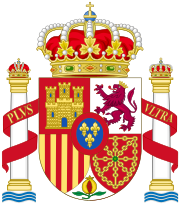
The politics of Spain takes place under the framework established by the Constitution of 1978. Spain is established as a social and democratic sovereign country wherein the national sovereignty is vested in the people, from which the powers of the state emanate.

The prime minister of Spain, officially president of the Government, is the head of government of Spain. The prime minister chairs the Council of Ministers and nominates its ministers; in these sense, the prime minister establishes the Government policies and coordinates the actions of the Cabinet members. As chief executive, the prime minister also advises the monarch on the exercise of their royal prerogatives.
A motion or vote of no confidence is a formal expression by a deliberative body as to whether an officeholder is deemed fit to continue to occupy their office. The no-confidence vote is a defining feature of parliamentary democracy which allows the elected parliament to either affirm their support or force the ousting of the cabinet. Systems differ in whether such a motion may be directed against the prime minister only or against individual cabinet ministers.

The Spanish Socialist Workers' Party is a social-democratic political party in Spain. The PSOE has been in government longer than any other political party in modern democratic Spain: from 1982 to 1996 under Felipe González, 2004 to 2011 under José Luis Rodríguez Zapatero, and since 2018 under Pedro Sánchez.

The Senate is the upper house of the Cortes Generales, which along with the Congress of Deputies – the lower chamber – comprises the Parliament of the Kingdom of Spain. The Senate meets in the Palace of the Senate in Madrid.

The 2004 Spanish general election was held on Sunday, 14 March 2004, to elect the 8th Cortes Generales of the Kingdom of Spain. All 350 seats in the Congress of Deputies were up for election, as well as 208 of 259 seats in the Senate.

Mariano Rajoy Brey is a Spanish politician who served as Prime Minister of Spain from 2011 to 2018, when a vote of no confidence ousted his government. On 5 June 2018, he announced his resignation as People's Party leader.
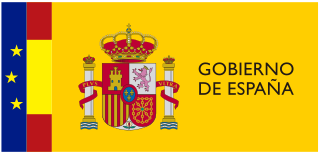
The government of Spain is the central government which leads the executive branch and the General State Administration of the Kingdom of Spain.
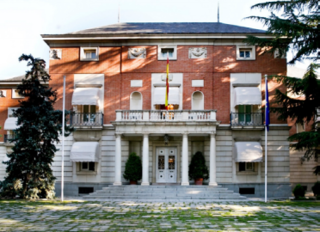
The Palace of Moncloa or Moncloa Palace is the official residence and workplace of the President of the Government, a position usually known in the English language as the Prime Minister of Spain. It is located in Puerta de Hierro Avenue, in the Moncloa-Aravaca district in Madrid. It has been the official residence of the Prime Minister since 1977, when Adolfo Suárez moved the residence from the Palace of Villamejor.

In the history of contemporary Spain, the death of caudillo Francisco Franco on 20 November 1975 marked the beginning of the Spanish transition to democracy, the establishment of the parliamentary monarchy and the subsequent accession of King Juan Carlos I to the throne. In 1978, the current Spanish Constitution of 1978 was signed and the status of Spain's autonomous entities (autonomías) was defined.
The Spanish order of precedence is currently prescribed by Royal Decree 2099/1983. The decree establishes the order of precedence of national official activities as well as common regulations to activities organised by municipalities, autonomous communities and other public institutions. The general order established by the decree is modified if the event takes place in the capital, Madrid, instead of elsewhere in Spain.

The 2008 Spanish general election was held on Sunday, 9 March 2008, to elect the 9th Cortes Generales of the Kingdom of Spain. All 350 seats in the Congress of Deputies were up for election, as well as 208 of 264 seats in the Senate.
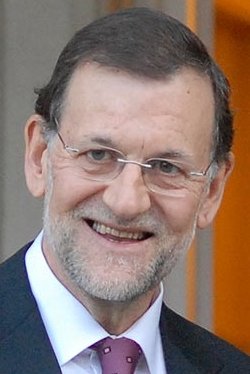
The 2011 Spanish general election was held on Sunday, 20 November 2011, to elect the 10th Cortes Generales of the Kingdom of Spain. All 350 seats in the Congress of Deputies were up for election, as well as 208 of 266 seats in the Senate. An election had not been due until April 2012 at latest, but a call by Prime Minister José Luis Rodríguez Zapatero for a snap election five months ahead of schedule was announced on 29 July 2011. Zapatero would not be seeking a third term in office, and with political pressure mounting, a deteriorating economic situation and his political project exhausted, an early election was perceived as the only way out.

The 2016 Spanish general election was held on Sunday, 26 June 2016, to elect the 12th Cortes Generales of the Kingdom of Spain. All 350 seats in the Congress of Deputies were up for election, as well as 208 of 266 seats in the Senate.

María Soraya Sáenz de Santamaría Antón is a Spanish former politician of the People's Party who served as Deputy Prime Minister of Spain and Minister of the Presidency from 2011 to 2018. She was member of the Congress of Deputies representing Madrid from 2004 until 2018.

The 2014 Extraordinary Federal Congress of the Spanish Socialist Workers' Party was held in Madrid from 26 to 27 July 2014, to renovate the governing bodies of the Spanish Socialist Workers' Party (PSOE) and establish the party's main lines of action and strategy for the next leadership term. A primary election to elect the new party secretary-general was held on 13 July. The congress was called by outgoing PSOE leader Alfredo Pérez Rubalcaba after his party's poor results at the 2014 European Parliament election, garnering just 23% of the vote. Rubalcaba announced his intention not to run for either his party's leadership or for the 2015 Spanish general election.

Pedro Sánchez Pérez-Castejón is a Spanish politician who has been Prime Minister of Spain since June 2018. He has also been Secretary-General of the Spanish Socialist Workers' Party (PSOE) since June 2017, having previously held that office from 2014 to 2016, and was elected President of the Socialist International in November 2022.

Susana Díaz Pacheco is a Spanish politician from Andalusia and a leading figure in the Spanish Socialist Workers' Party (PSOE) as the former leader of the Andalusian PSOE-A.
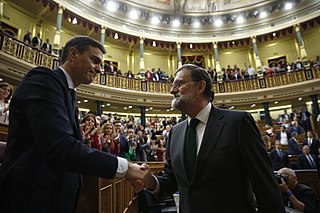
A motion of no confidence in the Spanish government of Mariano Rajoy was debated and voted in the Congress of Deputies between 31 May and 1 June 2018. It was brought by Spanish Socialist Workers' Party (PSOE) leader Pedro Sánchez after the governing People's Party (PP) was found to have profited from the illegal kickbacks-for-contracts scheme of the Gürtel case in a court ruling made public the previous day. This was the fourth motion of no confidence since the Spanish transition to democracy and the first one to be successful, as well the second to be submitted against Mariano Rajoy after Unidos Podemos's motion the previous year. Coincidentally, it was held 38 years after the first such vote of no confidence in Spain on 30 May 1980.
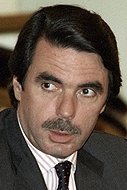
The 14th National Congress of the People's Party was held in Madrid from 25 to 27 January 2002, to renovate the governing bodies of the People's Party (PP) and establish the party's main lines of action and strategy for the next leadership term. It saw José María Aznar being re-elected unopposed for a fifth term as party president, with 99.6% of the delegate vote in the congress and 0.4% of blank ballots (10).
